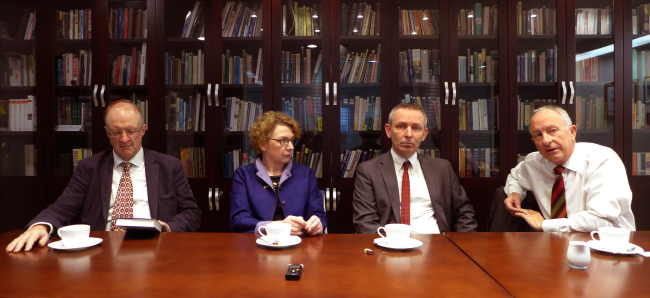As a result of united efforts to follow through the Good Friday Agreement of 1998, the island of Ireland, by and large, is a separated country at peace now.
The agreement ended an ethnoreligious conflict of over 750 years, which had intensified from the late 1960s fueled by Irish independence causes. Violence has withered substantially, after more than 3,000 people were killed along the way.
The paramilitary Irish Republican Army was disbanded and transformed into a political party, and cooperative projects have sprung up between Northern Ireland and Ireland.
Pundits note that the deal’s overall success comes from bold compromise between the North’s unionist and nationalist parties, legal agreements between the Irish and British governments and institutionalization of cooperative initiatives across the Irish isle.
Unlike in Korea, where national unification is constitutionally enshrined and societally encouraged, a united Ireland remains a distant possibility, for the time being.
“It’s been 17 years since the agreement was signed, and it would be safe to say that we now have achieved stable peace,” Dermot Ahern, former Irish Foreign Minister, told The Korea Herald last week.
“Korea’s division is quite different from that of Ireland, and that may be why you look at the German case more. We are not as far as Germany, currently in post-unification, but can offer another way toward coprosperity.”
Ahern, along with the Irish Ambassador to Korea Aingeal O’Donoghue, Dublin City University professor John Doyle and former Irish Times journalist and author Deaglan de Breadun, gave an interview at the Irish embassy in Seoul. They came to Korea to strengthen policy dialogues and academic research with the Korean government and knowledge institutions.
According to Kim Jung-ro, the director of the Institute for Unification Education under the Ministry of Unification, who recently published the book, “The Irish Peace Process,” the conflict between the Protestant pro-British unionists and Catholic Irish nationalists traces its root to the late 12th century, with the Norman invasion of Celtic Ireland.
In the modern era, the island was divided after the creation of an independent Irish Free State in 1921, which left Northern Ireland under the unionist majority rule.
“The conflicts arose because of discrimination against the Catholics by the Protestant majority in Northern Ireland,” de Breadun explained, adding that discrimination was rampant in the local government, law enforcement, housing, employment and education.
To achieve their desired goals, the republican party Sinn Fein and the IRA pursued dual tactics exploiting democracy and violence, publicly touted by the clarion call, “ballot box on one hand, and Armalite on the other,” Ahern highlighted.
The former foreign minister acknowledged that criminal activities persisted near the border areas through cigarette smuggling and diesel laundering, the works of ex-paramilitary members.
The mainstay of the institutionalization was the six cross-border bodies, covering waterways, food safety, trade and business, European Union programs, language, lake and lights, created under the North-South Ministerial Council. Tourism Ireland has been promoting the whole island as a united destination.
According to Ahern, the bodies served as “quid pro quo” to the deletion of the constitutional articles 2 and 3, which defined the national territory to be the entire island. Integrating the peoples and communities was more important than unifying the territories, he claimed.
Doyle echoed the view, saying that if the Northerners were to join Ireland through a referendum, the U.K. government would facilitate the process, as agreed.
The Northern Ireland Assembly, which compulsorily involved all parties in politics, was another crucial mechanism, according to de Breadun. The assembly has proportionally allocated executive cabinet seats based on votes won, following the d’hondt system, in an effort to prevent single party domination.
This helped ensure legal equality between the Protestants and Catholics, removing the support base for terrorist activities, he stressed.
O’Donoghue underscored that regional cooperation within the European Union was instrumental in dissolving barriers and cementing trust between officials.
“When we first joined the EU in 1973, people were afraid of losing their culture and identity, thinking that they would be subsumed into the larger Europe,” Ahern said.
“In fact, what happened was that we got stronger. Whereas we were more inward-looking and defensive before, we have become more confident and outward-looking.”
The EU also provided special funds to the 12 counties in Northern Ireland and southern border areas for community and infrastructure development. Some of the funds went to employ community workers, including those previously belonging to the IRA, he said.
Regarding national identity, all participants agreed that a strong Irish identity continued thriving, albeit based on “cultural nationalism,” celebrating the Celtic tradition, language and heritage, as opposed to the yesteryears’ strident and violent endeavors.
“Our identity is not a finished process,” the ambassador added, indicating that the Irish society had become progressively multicultural, multiethnic and multireligious. The attitude of the younger generations regarding the unification has also shifted significantly from supporting compulsion to compromise.
Most people still cling to aspirations of unity, Ahern noted, but would prefer to put their idealism on the backburner for nearer concerns.
“I was surprised that Korea had a ministry of unification,” De Breadun said. “We wouldn’t have one in Ireland. It would be seen as provocative, and raise false hopes for the nationalists.
“We are saying to the unionists, ‘let’s work together in tourism, trade and waterways, and maybe over time, we could get around talking about unity.” He added, “If we can work well together over these areas, then why not over everything?”
By Joel Lee (
joel@heraldcorp.com)








